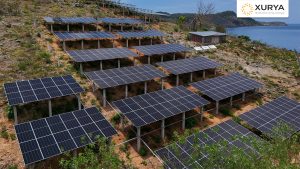Jakarta—The Civil Society Coalition for a Just Energy Transition urges the government to evaluate the implementation of the economic value of carbon (NEK) and stop granting greenhouse gas emission reduction certificates (SPE-GRK) for fossil fuel projects. This step is considered urgent to ensure a more credible approach to achieving the net-zero emissions (NZE) target in 2060 that does not conflict with emission reduction commitments.
“The current NZE policy is more of an economic tool than a climate solution,” said Bhima Yudhistira, Executive Director of CELIOS in a written statement, Friday, January 24.
Bhima highlighted that the government is still allocating SPE-GRK for fossil fuel-based projects, such as the coal-powered steam power plant (PLTGU), which fundamentally contradicts the spirit of the energy transition.
Bhima said that this step is not in line with efforts to reduce emissions and is a bad signal for renewable energy investors. He also said that SPE-GRK should be given to projects that really have an impact on reducing emissions, not just accommodating projects that still depend on fossil energy.
Biomass and biofuel co-firing criticised
The coalition also asked the government to evaluate the biomass co-firing program in coal-fired power plants. Anggi Putra Prayoga, a Campaigner for Forest Watch Indonesia (FWI), said that this program risks becoming a false solution that actually extends dependence on coal.
“Implementing co-firing is full of fraud, such as mixing biomass with water to increase tonnage before burning. This practice harms the state and lies to the public,” Anggi said.
In addition, the biofuel program, including the 50% biodiesel (B50), is considered to create long-term environmental impacts, especially related to clearing new land for energy crops. “Biofuels contradict global climate commitments and threaten forest sustainability,” he added.
The government also received criticism for incorporating new energy sources, such as nuclear and downstream coal, into the energy transition policy. “The focus on building up to 5 GW of nuclear power plants by 2040 is a high-risk, expensive decision and less relevant to sustainable energy needs,” Bhima said.
The coalition highlighted that at the G20 Summit in Brazil, President Prabowo Subianto had committed to stop fossil plants in the next 15 years. However, the realisation of this commitment has shifted to a gradual reduction in capacity without a clear plan for the early retirement of fossil power plants.
The coalition also urges the government to strengthen the application of environmental, social, and governance (ESG) principles in energy investment. Indra Sari Wardhani, Acting Program Director of Koaksi Indonesia, said ESG should be a state defence system from social and environmental risks, not just an administrative requirement.
In addition, renewable energy financing incentives for MSMEs and cooperatives are considered inadequate even though the Chamber of Commerce and Industry (Kadin) has committed to supporting their implementation.
The coalition reminds the government that achieving the NZE target will be difficult without a thorough evaluation of the NZE, SPE-GRK, and other energy policies. “Inconsistent policies will only slow the energy transition and weaken Indonesia’s position in the global climate change map,” said Bhima.
The coalition calls for the NEK policy to focus on supporting credible, transparent, and accountable renewable energy development to achieve more ambitious and sustainable emission targets. (Hartatik)















